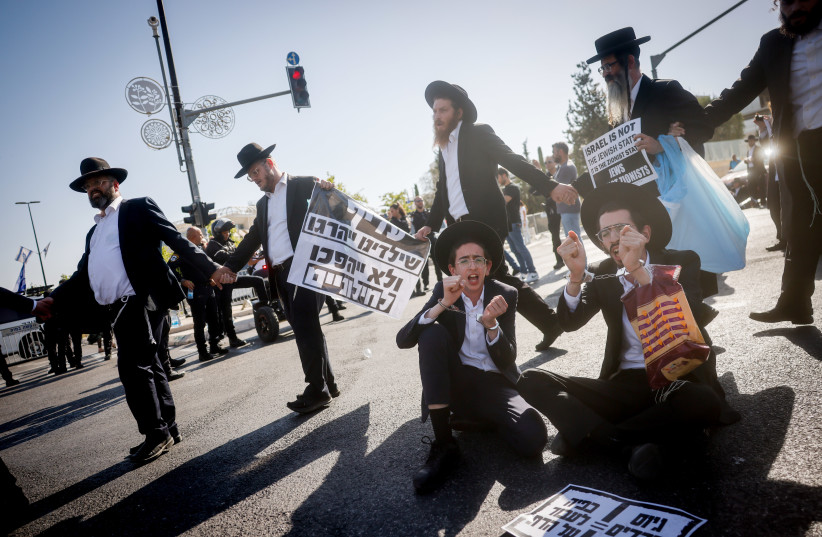What will final impact be of High Court hearing on haredim in the IDF?
While critics of the High Court of Justice who have spent little or no time in the courtroom like to vilify the justices as activists, most of the justices, when in court are reserved, technical, and consciously avoid drama.
Except on Sunday.
During the hearing over how and to what extent to integrate haredim into the IDF and national service, the justices came out swinging.
Part of what was so surprising about the hearing was that three of the most conservative voices – Justices Noam Sohlberg, Alex Stein, and Yael Wilner – were among the roughest and most aggressive critics of the government.
Sohlberg was furious that the IDF offered, as an initial measure, to take in a minimum of 3,000 haredim out of over 60,000 eligible draftees over the course of the 2024 recruitment class, and that the government even refused this.

Stein and Wilner laid waste to the government’s legal claims that mid-level IDF officers could have wide discretion to give haredim broad exemptions from military service, even beyond specific individuals’ extenuating circumstances.
In rare moments, the sense was that the justices were emotionally disturbed by the idea that during an ongoing war that has taken the lives of around 1,500 Israelis, haredim still feel that asking them to do the same service is oppression.
A different sentiment among Israelis pre-war and mid-war
When a haredi man vowed that the haredim he knew would rather die than be drafted, it rang much hollower mid-war than in the past.
If, in the past, such statements had a shock value that made most Israelis who do serve hold their heads in shock and decide to move on because the difficulty of negotiating with such a stubborn sector of the country was too great, the war has changed things.
People who have lost loved ones or community members to Hamas day after day, month after month, are not so shocked by threats to die over a hypocritical principle (since many haredim avoiding IDF service are not fully studying in yeshivot).
In a comical moment, Acting Chief Justice Uzi Vogelman (“acting” because Justice Minister Yariv Levin has blocked Yitzhak Amit from taking office since October 2023) told the government’s lawyer that in trying to sound coherent and reasonable, he had essentially adopted the arguments of both the attorney-general and the NGOs who brought the petition to draft haredim.
There was no question of where the court was going with this – only how far.
In late March, the court froze one-third of some of the government-sponsored funds for the approximately 1,750 haredi yeshivot. But this did not impact the vast majority of the over 60,000 Haredim in play for IDF or national service.
It also did not impact significant non-government funds that the haredi institutions raise.
Much as some of the haredi advocates talk about the reduction in funds as a life-and-death issue, if it truly were, they would have cut a new compromise deal by now for increasing draft numbers, albeit not as high as some parties want.
That is not what has happened since April.
The haredi political parties rightly judged that most of their government funding would not be touched any earlier than August. Furthermore, they rightly judged that this meant that they could use the time in between to play games surrounding potential new legislation that does not radically increase haredi IDF service, as long as it increases national service or throws some other bone toward the High Court and critics.
Moreover, they rightly judged that if they felt really stuck, they could freeze the current situation by going to new elections.
ON SUNDAY, it seemed like the High Court was leaning toward ordering the government and the IDF to immediately draft a minimum of 3,000 new haredi IDF recruits.
This would not be insignificant, but it would still be less than 25% of the current haredi recruitment class and would not touch any of the older classes.
The court might also say that as of August, its interim order to freeze all funds, not just one-third, for Haredi institutions whose students do not show up for their draft dates has become final.
But this would still leave the haredim all of the above escape options between now and August.
If the court were truly aggressive, it would have frozen all funds back in April or in mid-2023, when the prior law had expired, or several years earlier, when other prior laws had expired.
Still, October 7 does seem to have made the court and the general public more ready to go to the mat with the haredim on the issue.
If the trend continues, some truly interesting changes will likely take place in Israeli society, whether before or after a future election.





Comments are closed.